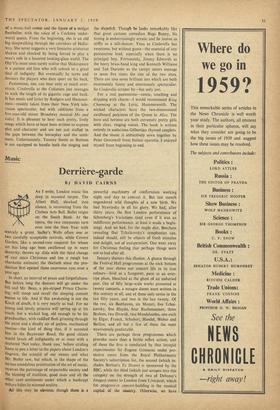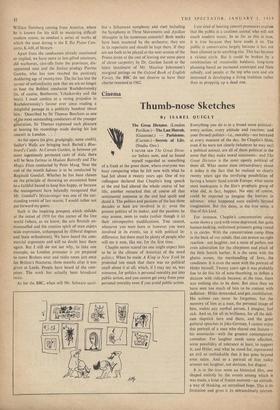M u s i c
Derriere-garde
By DAVID CAIRNS As I write, London music lies deep in seasonal torpor. The Albert Hall, shocked into silence, is recovering from the Chelsea Arts Ball. Ballet reigns on the South Bank. At the opera, the two companies turn over into the New Year with scarcely a grunt. Sadler's Wells offers one or two carefully acceptable revivals, while Covent Garden, like a second-rate conjuror for whom art has long ago been swallowed up in mere dexterity, throws up Aida with the third change of cast since Christmas and (on a rough but charitable estimate) the thirtieth since the pro- duction first opened- those enormous eyes over a year ago.
In short, an interval of peace and forgetfulness. nut before long the dancers will go under the bill and Mr. Bean, a pin-striped Prince Charm- ing, will stoop and recall the sleeping concert season to life. And if this awakening is not the kisch of death, it is very nearly as bad. For no young and lovely princess will spring up at his touch, but a wicked hag, old enough to be his grandmother, with raddled flesh grinning through the paint and a deadly air of joyless, mechanical routine—the kind of thing that, if it accosted him in the Bayswater Road, the good citizen Would brush off indignantly or at most with a Muttered 'Not today, thank you,' before striding home to pen a letter to the papers about London's disgrace, the scandal of our streets and what Mr. Butler saw, but which, in the shape of the no less scandalous prostitution of the art of music, receives the patronage of respectable society and the blessing of tradition, good taste and all the other cant sentiments under which a bankrupt Culture hides its wizened senility.
All this may be obvious, though there is a powerful machinery of conformism working night and day to conceal it. But last month engendered wild thoughts of a new birth. We had Stravinsky in all his glory. We had, after thirty years, the first London performance of Schonberg's Variations (and even if it was an indifferent performance, at least it made a begin- ning). And we had, for the staple diet, Beecham revealing that Tchaikovsky's symphonies can, indeed should, still be objects of fresh stimulus and delight, not of exasperation. One went away for Christmas feeling that perhaps things were not so bad after all.
January shatters this illusion. A glance through the Festival Hall programmes at the rock bottom of the year shows our concert life in its true colours—livid as a hangover, puce as an over- ripe plum, blanched as the ghost of an unburied past. Out of fifty large-scale works presented at twenty concerts, a meagre dozen were written in this century at all, and of these only seven in the last fifty years, and two in the last twenty. Of the rest, six Beethoven, six Mozart, five Tchai- kovsky, five Haydn, four Rachmaninov, three Brahms, two Dvorak, two Mendelssohn, one each by Elgar, Franck, Schubert, Handel, Weber and Berlioz, and all but a few of them the most wearisomely predictable.
There are perhaps three programmes which provoke more than a feeble reflex action; and of these the first is conducted by that intrepid experimenter Sir Eugene Goossens under pro- tective cover from the Royal Philharmonic Society's subscription list, the second (which in- cludes Berlioz's Te Deilm) is sponsored by the BBC, while the third (which just scrapes into this category on the strength of two of Debussy's Images) comes to London from Liverpool, which for progressive concert-building is the musical capital of the country. Otherwise, we have William Steinberg coming from America, where he is known for his skill in mastering difficult modern scores, to conduct a series of works of which the most daring is the E flat Piano Con- certo, K.449, of Mozart.
Apart from the conductors already mentioned or implied, we have more or less gifted amateurs, old warhorses, cast-offs from the provinces, dis- appointed men and the Italian prodigy Pierino Gamba, who has now reached the positively doddering age of twenty-two. The list has lost the savour of unfamiliarity now that we are no longer to hear the Bolshoi conductor Rozhdestvensky (in, of course, Beethoven, Tchaikovsky and the boys). I must confess to a strong prejudice in Rozhdestvensky's favour ever since reading a delightful passage in a publicity handout about him : 'Described by Sir Thomas Beecham as one of he most outstanding conductors of the younger generation, Sir Thomas expressed such pleasure at hearing his recordings made during his last concert in London. . .
As for opera (to give, grudgingly, some credit), Sadler's Wells are bringing back Bartok's Blue- beard's Castle. At Covent Garden, in between yet more ingeniously permuted casts of Aida, there will be Sena Jurinac in Madam Butterfly and The Magic Flute conducted by Peter Maag. Near the end of the month Salome is to be conducted by Reginald Goodall. Whether he has been chosen on the principle of throwing an occasional bone to a faithful hound to keep him happy, or because the management have belatedly recognised that Mr. Goodall's Meistersinger was one of the out- standing events of last season, I would rather not put forward my guess.
Such is the inspiring prospect which unfolds at the outset of 1959 for this corner of the free world (where, as we know, the arts flourish un- trammelled and the creative spirit of man enjoys wide expression, unhampered by illiberal dogmas and State orthodoxies). We have heard the com- mercial arguments and will no doubt hear them again. But I still do not see why, to take one example, no London promoter is yet prepared to move Brahms over and make room just once for Britten's Nocturne, three months after it was given at Leeds. People have heard of the com- poser. The work has actually been broadcast twice.
As for the BBC, when will Mr. Schwarz sacri- fice a Schumann symphony and start including the Symphony in Three Movements and Apollon Musagete in his numerous concerts? Both works have been mastered by the orchestra; they are in its repertoire and should be kept there. If they are not both to be played at the next session of the Proms (even at the cost of leaving out some piece of clever carpentry by Dr. Gordon Jacob or the latest instalment of Mr. Maurice Johnstone's marginal jottings on the Oxford Book of English Verse), the BBC do not deserve to have their charter renewed in 1962. I am tired of hearing concert promoters explain that the public is a cautious animal who will not touch modern music. In so far as this is true, it is true because they have made it so. The public is conservative largely because it has not been allowed to be anything else. This has become a vicious circle. But it could be broken by a combination of reasonable boldness, long-term planning based on increased municipal and State subsidy, and people at the top who care and are interested in developing a living tradition rather than in propping up a dead one.











































 Previous page
Previous page